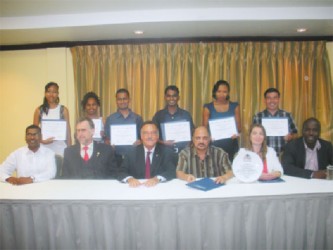Guyanese will soon be the beneficiaries of improved drug standards and safer, more effective prescription drugs through the training of staff of the Government Analyst Food & Drug Department (GAFDD).
This is according to Minister of Health Dr Bheri Ramsaran, who at a cocktail reception held last evening at Cara Lodge, expressed the hope that there would be improved drug testing in Guyana.
The reception was held in honour of the eight GAFDD staff members who completed the third phase of training made possible by the Argentine Horizontal Cooperation South-South and Triangular Cooperation Fund (FOAR), and financed by the Ministry of Foreign Affairs of Argentina and the Pan-American Health Organisation/World Health Organisation (PAHO/WHO).

According to Chief Medical Officer Dr Shamdeo Persaud, medicine is under siege globally with the high influx of counterfeit drugs. He said it is the job of health services to ensure that the medicines provided are of good quality.
Persaud said the infiltration of fake drugs is so high that even purchases from reputable suppliers can sometimes yield low-quality drugs.
He mentioned a recent study of malaria drugs which found that up to 60% of some of the medicines did not have the effective active ingredients. In a country such as Guyana, with a high number of persons infected with malaria, this could have serious implications.
According to Ramsaran, the eight newly trained members of GAFDD are Guyana’s main defences against ineffective drugs.
With the five-day training the staff members are now competent in a number of testing including dissolution and related substance tests. Testing tuberculosis drugs was also a part of the training.
The first two phases of the training programme were conducted in Jamaica and Argentina, respectively, and Guyana is one of four participating countries. The others are: Jamaica, Trinidad and Tobago, and Suriname.
Director of the Food & Drugs Department Marlan Cole opined that the partnership with the Argentine government is timely and promised continued collaboration between Guyana and Argentina.
Ramsaran expressed admiration for Argentina for its interest in a country in a less fortunate position and hinted at several projects Argentina, in collaboration with Guyana’s Ministry of Health, will be embarking on. The proposed projects include training of newly graduated doctors not only in Guyana but also in Argentina.





